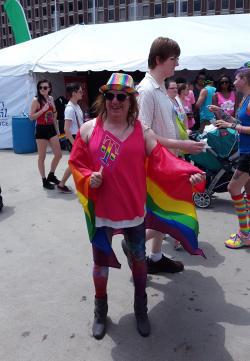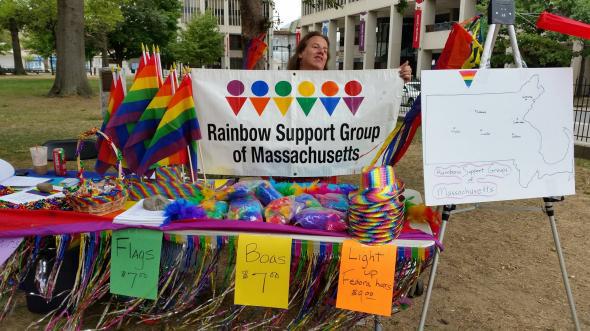Robert arrives at an old friend’s Brooklyn Pride party with a box of Oreos for the potluck and a bag of records for his inevitable DJ set. It’s a hot June afternoon and an opportunity to catch up with other LGBTQ adults with developmental disabilities. Robert, who is 46 and identifies as bisexual, can recognize almost any disco tune and recall the year of its release. With the help of direct support professionals, Robert maintains his own apartment. However, his support staff are around so often that finding time with his boyfriend Terry is an ongoing challenge.
“It’s been hard for us to be intimate,” Terry chimes in, enjoying a plate of food. “There are a lot of people around.”
For people with developmental disabilities on the LGBTQ spectrum, dating can be an exacting endeavor. But Robert identifies as a self-advocate, a person who isn’t afraid to speak up for his own wants, needs, and rights regardless of perceived ability. Over the years, Robert and Terry have had to fight for respect, privacy, and access to the LGBTQ community.
For folks like Robert, forging healthy relationships often depends on the availability and willingness of supportive staff to facilitate such interactions. But the direct support profession is in peril, facing high turnover, low wages, limited training, and ineffective supervision, according to the American Association on Intellectual and Developmental Disabilities. The AAIDD has called for more professional development opportunities so direct support professionals can handle their increasing responsibilities. As direct support professionals are thrown into more autonomous roles without proper supervision or training, they may be unwilling to tackle touchy subjects like sexuality and gender identity.
Pauline Bosma is a trans woman, self-advocate, and project director for the Rainbow Support Group in Massachusetts. She started the support group 15 years ago because “there was nobody to give support to people with disabilities who were LGBT.” Pauline remembers a man who came into the group asking what it meant for him to like men. Pauline provided a simple answer: “You’re gay.” “He said ‘thank you!’ and I asked why,” Pauline says. “He said because none of his staff wanted to answer that question.”

Pauline Bosma
Pauline suspects direct support professionals are “afraid they will get in trouble with their agency.” In her own experience, she has been shut out by agencies and staff who don’t want to become involved in LGBTQ politics and the free expression of sexuality of adults with developmental disabilities. Pauline, now 51, has been receiving services since she was 15. She came out as transgender to her agency and support staff about the same time she started the Rainbow Support Group, and describes the response as “we want to know about it, but we don’t want to know about it.”
Since Pauline came out, the direct support profession has made great strides in “person-centered approaches,” which aim to place the people receiving the services at the center of decisions relating to their lives. Still, LGBTQ adults with developmental disabilities struggle to connect with their peers, due in part to a strain on the workforce that supports them.
Eileen, a 30-year-old bisexual woman who lives in Brooklyn, likes her home and her staff. It’s not that her staff is hesitant to take her to the local LGBTQ support group for adults with developmental disabilities because of close-mindedness. But the residence she lives in supports five people, including Eileen. Eileen even has to share a room, which doesn’t leave her a lot of privacy. “I still go the LGBTQ group when I have staff to take me,” Eileen says. “But sometimes they don’t have staff to take me, and I miss those meetings.”
Eileen is currently dating a man named Brian. Brian lives close to Eileen’s day program, so sometimes she likes to stop by for dinner. But like Robert and Terry, they don’t get to be alone together too often. “Whenever I go over there, staff goes with me. They say I can’t be over there alone with him,” Eileen says. “I don’t know why. Sometimes I wish I could be alone with him. But there’s rules, and I have to follow them.”
Agencies are now starting to recognize the need for LGBTQ-inclusive services and are working with self-advocates to develop support groups. Gerald, 41, got involved with LGBTQ issues in 2016. Gerald, too, receives services to achieve his goals, which include buying a home and earning his degree. In terms of his sexuality, Gerald describes himself as a gay man. As a self-advocate, Gerald helps facilitate LGBTQ support groups for adults with developmental disabilities.
“I’ve found little community in the LGBTQIA world,” says Gerald. “I feel as though people with developmental disabilities are given a hard time with their sexual preferences. Many LGBTQIA spaces are not accessible to people with developmental disabilities. This is a struggle for me constantly when I want to visit other locations to meet new people.”
Despite theoretically having the opportunity to meet gay men with and without disabilities, Robert remains slightly intimidated by other LGBTQ spaces, such as nightclubs and bars. “I haven’t really been exposed to that kind of environment. I’d like to go to those places, sooner or later. I’d like to explore that part of the LGBT community,” Robert says. “I just don’t have the money … I haven’t ever been. I don’t know what those places are like.”
Pauline, too, has detected elements ableism in LGBTQ spaces outside of her support groups. Early on in her career in advocacy, Pauline reached out to Parents and Friends of Lesbians and Gays (PFLAG) to involve them in her work with adults with developmental disabilities and “they just kind of shrugged it off. In the LGBTQ community, people with disabilities are not even recognized yet.”
But Pauline remains hopeful on the next leg of her journey. She’s gotten her name legally changed and has an assistant to keep her organized as she coordinates seven Rainbow Support Group chapters in Massachusetts. She encourages anyone working with adults with developmental disabilities who come out as LGBTQ to find a resource for them, such as a support group. “In Massachusetts, I’m usually the person who gets that call,” Pauline says.
Robert and Gerald encourage agencies and staff to keep an open mind and to organize more events so LGBTQ adults with developmental disabilities can socialize with their peers. And despite feeling somewhat alienated from the parts of the LGBTQ community typically highlighted around Pride, the self-advocates relating their experiences echoed a familiar rallying cry: Don’t be afraid.
“Don’t be afraid to advocate [for yourself],” Robert says. “Speak up about it! There might be other people going through the same situation … like what I went through. It’s been a rough road for me, but I made it.”
